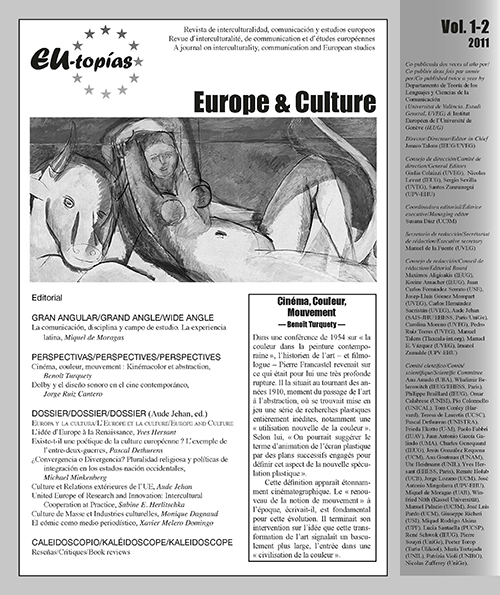Culture as a key factor within Western societies and a political tool for the European Union
DOI:
https://doi.org/10.7203/eutopias.1.18443Keywords:
European culture, culture and politics, european union, european citizenship Abstract
Abstract
What could be more antithetical than the alliance of the words “culture” and “political power”? Yet, for over fifty years, the process of European integration has been linking these opposing concepts: Europe, which is too often considered in economic terms, is first and foremost a cultural entity. European culture, ‘a sort of UFO’¹ for most Europeans has become a major political and philosophical issue. Given their political and strategic importance so-called ‘geo-cultural’ issues have been called upon to constitute, along with geopolitical and economic issues, a governance axis. The European Union’s current mode of cultural action, intrinsic to national policies, is unable to address these issues. Indeed the EU should completely rethink its conception and political implication of culture, and recognize its great importance, both for the success of European integration, and for the new civic relationships which are developing today in our local, national and global communities.
 Downloads
Downloads
 References
References
ADAMSKY, Dima (2009). The Culture of Military Innovation: The Impact of Cultural Factors on the Revolution in Military Affairs in Russia, the US, and Israel. Stanford University Press.
CASEY, Terence (2006). “Europe, Soft Power, and Genteel Stagnation”, Comparative European Politics Review, Volume IV, Number 4.
CLINTON, Hillary (2009). Confirmation hearings discourse of January 13, http://foreign.senate.gov/testimony/2009/ClintonTestimony090113a.pdf
CRUMLEY, Bruce (2009). “Berets and Baguettes? France Rethinks Its Identity”, Time Magazine, November 04.
CRUMLEY, Bruce (2010). “Why France’s National Identity Debate Backfired”, Time Magazine, February 12.
CSIS Commission on smart power, co chairs: Richard L. Armitage, Joseph S. Nye JR (2007). Washington: Center for strategic and International studies Press.
Culture Action Europe Newsletter # 8 – Making culture matter -December 2009.
European Commission, DG Enlargement, “Views on European Union Enlargement”, EB Flash 257, February 2009.
HABERMAS, Jürgen (1997). Droit et démocratie : entre faits et normes, trad. de l’allemand (Faktizität und Geltung : Beiträge zur Diskurstheorie des Rechts und des demokratischen Rechtsstaats) par R. Rochlitz et Christian Bouchindhomme. Paris: Gallimard, « NRF essais ».
HOWARD, Marc Morjé (2009). The Politics of Citizenship in Europe. Cambridge: Cambridge University Press.
JEHAN, Aude (2008). La culture au sein de l’UE: objet politique non identifié, coll. Euryopa, Institut européen de l’Université de Genève.
LEONARD, Mark (2005). Why Europe will run the 21st century. London: Fourth estate.
LUFT, Gal (2009). Beer, Bacon, and Bullets: Culture in Coalition Warfare from Gallipoli to Iraq. Booksurge.
MODOOD, Tariq et al (2006). Multiculturalism, Muslims and Citizenship: A European Approach. London: Routledge.
NYE, Joseph S. Jr. (2009). “Get smart”, International Herald Tribune, 16 January.
NYE, Joseph S. Jr. (2011). The Future of Power. New York: Public Affairs.
KYMLICKA, Will (2001). Politics in the Vernacular. Nationalism, Multiculturalism, and Citizenship. Oxford: Oxford University Press.
REID, T.R. (2004). The United States of Europe: The new Superpower and the End of American Supremacy. New York: Penguin.
REY, Micheline (1997). Identités culturelles et interculturalité en Europe, L’Europe en bref, CEC. Paris: Actes sud.
RICHARD, Ferdinand (2011). “The role of Culture in Defense and Security Policy: Soft power and political ecology”, European Green Party, Budapest, speech given on April 2nd.
RIFKIN, Jeremy (2004). The European Dream: How Europe’s vision of the future is quietly Eclipsing the American Dream. New York: Tarcher/Penguin.
RIVE, Emilie (2009). “Mouloud Aounit: « La France ne s’est toujours pas libérée du racisme »”, in L’Humanité, November 02.
STENOU, Katérina (2000). UNESCO and the issue of cultural diversity, Review and strategy, 1946-2003. Paris: UNESCO.
SWINGEWOOD, Alan (1998). Cultural Theory and the Problem of Modernity. New York: St. Martin’s Press.
Downloads
Published
How to Cite
-
Abstract555
-
PDF58
Issue
Section
License
![]()
The authors conserve the copyright. All content published in EU-topías. Journal of interculturality, Communication, and European Studies are subject to the license Creative Commons Attribution-NonCommercial-ShareAlike 4.0 license. The full text of the license can be found at <http://creativecommons.org/licenses/by-nc-sa/4.0>
They may be copied, used, disseminated, transmitted and publicly displayed, provided that:
- The authorship and original source of the publication is cited (journal, publisher and URL of the work).
- They are not used for commercial purposes.
- The existence and specifications of this license of use are mentioned.
It is the responsibility of the authors to obtain the necessary permissions for images that are subject to copyright.



